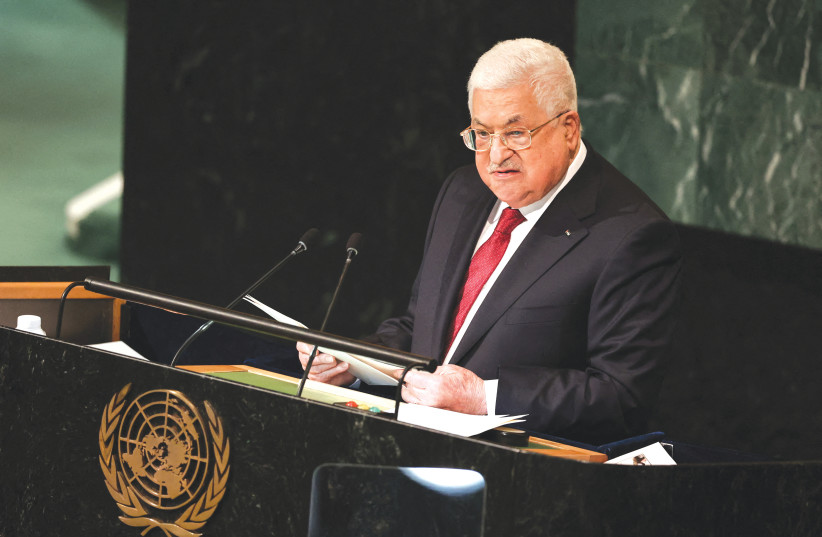For some Palestinians, the controversy in Israel over the judicial reforms proposed by the government of Benjamin Netanyahu is a sign of the near end of the “Zionist entity.”
But there are Palestinians who are also expressing appreciation for democracy in Israel, where hundreds of thousands of people are able to take to the streets to protest against the government and criticize Israeli leaders.
“I wish the day will come when we will see Palestinians demonstrating against our leaders without fear of being arrested or killed,” said a Palestinian author from east Jerusalem. “We can learn a lot from the Israeli democratic system.”
Comments by Palestinian journalists
A veteran Palestinian journalist from Ramallah commented: “No matter what we think about them (Israel), they are still better than us; at least they don’t have ‘presidential decrees.’”
Palestinian Authority President Mahmoud Abbas is often criticized by Palestinians for replacing laws with presidential decrees. In 2018, Abbas dissolved the Palestinian parliament, the Palestinian Legislative Council, whose members are unable to pass any laws.

Hashtags in Arabic such as “Israel is Falling Apart” and “Tel Aviv is Burning” have been trending on Twitter for the past few days in the aftermath of mass demonstrations held in Tel Aviv, Jerusalem and other parts of Israel protesting the judicial overhaul.
Several Palestinian and Arab social media users are gazing with malicious pleasure at scenes of clashes between protesters and police officers on the streets of Tel Aviv and Jerusalem, while others are talking about a “rebellion” in the Israeli security establishment which, they believe, proves that Israel is “weaker than a spider’s web.”
Other Palestinians and Arabs are drawing parallels between the turmoil in Israel and the “Arab Spring,” a series of anti-government protests, uprisings and armed rebellions that spread across much of the Arab world in 2010. They are now calling the protests in Israel “The Jewish Spring.”
Palesitnians and Arabs are posting videos of the demonstrations throughout the country, while others are quoting the many Israelis who are talking about the prospects of civil war.
Palestinian newspaper editor Abdel Bari Atwan claimed that Israel “is quickly turning into a third world country” and is no longer feared as a military superpower.
“That’s why Israel’s most prominent opponents in Lebanon, Gaza, Syria, Iraq, and Yemen have the right to rub their hands with joy,” Atwan wrote in the London-based online newspaper Rai Al-Youm. “The coming days will be full of unpleasant surprises for the occupying state and its supporters in Europe and America, as well as its Arab friends. Israel is currently living through its worst days.”
The Palestinian Authority has thus far refrained from commenting on the controversy in Israel surrounding the judicial reforms.
“This is an internal Israeli affair,” said a senior Palestinian official in Ramallah. “Our policy is not to interfere in Israel’s internal affairs, but we are glad to see that many Israelis understand how dangerous this right-wing government is.”
The silence of the PA has drawn sharp criticism from some Palestinians, who believe the Ramallah-based leadership should seize the opportunity to step up the campaign to isolate Israel in the international community and depict it as a rogue and undemocratic state.
“There are no longer any Palestinian institutions that really know the map of the internal conflict in Israeli society,” complained Palestinian political analyst Abdel Majid Sweilem.
Publishing cartoons about the “nature of the conflict in Israeli society was insufficient,” he argued.
“Why is the international community expressing fear and warning of the Israeli [government’s judicial] ‘coup’ while the Palestinian leaders are awaiting the results of this coup?” Sweilem asked in an article published in the PA’s official newspaper Al-Ayyam. “If the whole issue is an internal Israeli affair, why don’t we completely boycott the racist Israeli government, and why don’t we participate in isolating and exposing it instead of maintaining channels of communication with it? Israel is facing the biggest crisis, and this could provide an historic opportunity [for the Palestinians] that I do not think will ever be repeated.”
Hassan Asfour, another political activist and former PA official, also took the Palestinian leadership to task for allegedly failing to cash in on the crisis in Israel.
“The Palestinian leadership must wake up,” Asfour wrote in the Palestinian news website Amad. “It is not rational for the Palestinian leadership to stand by and watch developments that have a direct impact on the [Palestinian’s] national issue and their political future.”
Hamas and Palestinian Islamic Jihad (PIJ) have also been closely following the controversy in Israel over the judicial reforms.
Websites affiliated with the two Gaza-based terror groups have been reporting extensively about the crisis, mostly by translating and quoting reports in various Israeli media outlets. Political analysts affiliated with Hamas and PIJ are quoted as saying that the crisis shows that the countdown for the demise of the “Zionist entity” has begun.
